Teeth grinding/bruxism
Occlusion splints effectively help to stop
OUR PRICES:
FOS splint against teeth grinding = from 500 CHF
FOS DEPROGRAMMER – GENTLE ON THE TEETH, EASY TO CARRY
In order to prevent unwanted grinding of teeth while sleeping, the FOS splint we use takes advantage of the functional properties of the front teeth. Each tooth is connected to the chewing muscles via nerve fibers. If too much pressure is placed on the front teeth when biting, receptors tell the chewing muscles to relax and let go, which is a so-called protective reflex. Our splint takes advantage of exactly this protective reflex and reduces night-time teeth grinding by up to 70 %. Because the bite in the front is blocked by the splint, you can no longer bite or press on the side teeth at night. In this way, unphysiological biting patterns can be “deprogrammed”.
YOUR BENEFITS
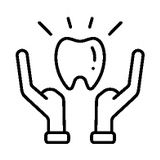
Innovative material concept
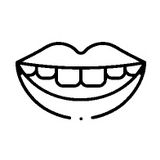
Easy to wear
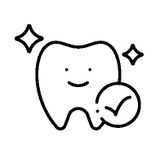
Relieves jaw tension
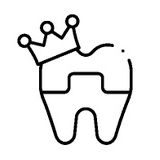
Relieves jaw pain
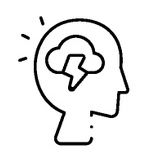
Often also helps with headaches/migraines

Low cost

EXTRA SMALL – EXTRA SMART
The deprogrammer splint we prefer is a so-called front tooth JIG, a plastic splint that is worn over the front teeth alone (top or bottom). For teeth grinding, we use the splint from FOS (flexi orthotic system ©), a development in the field of deprogrammers, and we chose this system because the splint is made from an innovative material that offers many advantages for both the patient and the dentist. Unlike the common (bulky) full-jaw splints, the small FOS splint is easy to wear, without tension or the sensation of a foreign body in the oral cavity. The splint hardly discolors even when worn for a long time and does not compromise on hygiene. In addition, any repairs or modifications can be carried out quickly and easily.
TREATING TEETH GRINDING – YOUR PATH TO BREATH
To put an end to teeth grinding while sleeping and to protect your teeth, a visit to the dentist is the first choice. We can offer you a so-called bite splint, which helps to reduce or even prevent nighttime clenching, grinding and grinding of teeth. In addition to a visit to the dentist, consciously reducing your stress level is an important step in reducing bruxism. Find out in which environment you feel stress and tackle the problem directly. We advise We will be happy to give you useful tips!


Frequently asked questions
What exactly is teeth grinding/bruxism and when does it occur?
When grinding or clenching teeth (technical term “bruxism”), those affected unconsciously rub or press their upper and lower jaws together. Although bruxism usually happens at night while you are sleeping, it can also happen during the day, usually unconsciously, and is often a habit acquired over years. Not only the dentition, teeth and tooth enamel suffer from the sometimes immense forces that occur when grinding teeth, but also the jaw joints and chewing muscles (myoarthropathies). It can be a cause of muscle tension, headaches, migraines and even tinnitus.
What is the cause of teeth grinding?
The cause of teeth grinding often has a psychological background. Stress or the processing of stress at night is usually to blame for grinding, but diseases of the periodontium, functional disorders of the jaw joint and neurological diseases can also be possible causes. Another cause could simply be incorrect contact between the teeth. Incidentally, alcohol and caffeinated drinks promote night-time grinding of teeth in those already affected.
How do I find out if I have teeth grinding/bruxism?
The chewing muscles may hurt, especially when you wake up in the morning. Sometimes your jaw cracks when you open and close your mouth. It's best to feel the muscles on your cheek towards the jaw joint in the morning and feel whether they are tense or hardened. Maybe small lumps have formed there too? Does your jaw hurt? The partner will also probably know if you grind your teeth while sleeping. Just ask!
You can be sure when you contact our Ms. Med. dent. Ask Dana Marinescu. You can see it, among other things, in the flattened cusps of the teeth and the worn-down tooth enamel. So-called cut facets are then created. Pressing your teeth together can also lead to fine cracks in the tooth enamel, open tooth necks and chipping of the enamel. Finally, by palpating the cheek muscles and jaw, it can be determined whether there is hardening or enlargement.
How harmful is teeth grinding?
Untreated bruxism can lead to a range of problems including tooth wear, tooth fractures, TMJ problems and even chronic headaches. In severe cases, this can significantly affect the quality of life.
What can I do about grinding my teeth?
There are several treatment options, including bite splints, relaxation techniques, stress management, and in some cases, drug therapy. The individual treatment plan is determined in consultation with our dentist and can include a combination of several measures.
Is bruxism curable?
The symptoms can usually be effectively alleviated through targeted treatment approaches. The effects can be minimized through regular checks and adjustments to the therapy plan.
Can bruxism lead to other health problems?
Yes, if left untreated, bruxism can cause other health problems such as temporomandibular joint disorders, sleep disorders, and chronic headaches. Therefore, early diagnosis and treatment is crucial.
Can children also be affected by bruxism?
Yes, bruxism can occur in childhood. The symptoms are similar to those in adults and early treatment is also recommended to avoid long-term damage.
Can medication help?
Medication is usually only a temporary solution and is only recommended in certain cases. Muscle relaxants or anti-anxiety medications may be used short-term to relieve symptoms. However, in the long term, the cause of bruxism should be treated.
What is the connection between bruxism and stress?
Stress is a known and significant trigger for bruxism. Therefore, relaxation exercises and stress management techniques are an integral part of many therapeutic approaches to treating teeth grinding.






